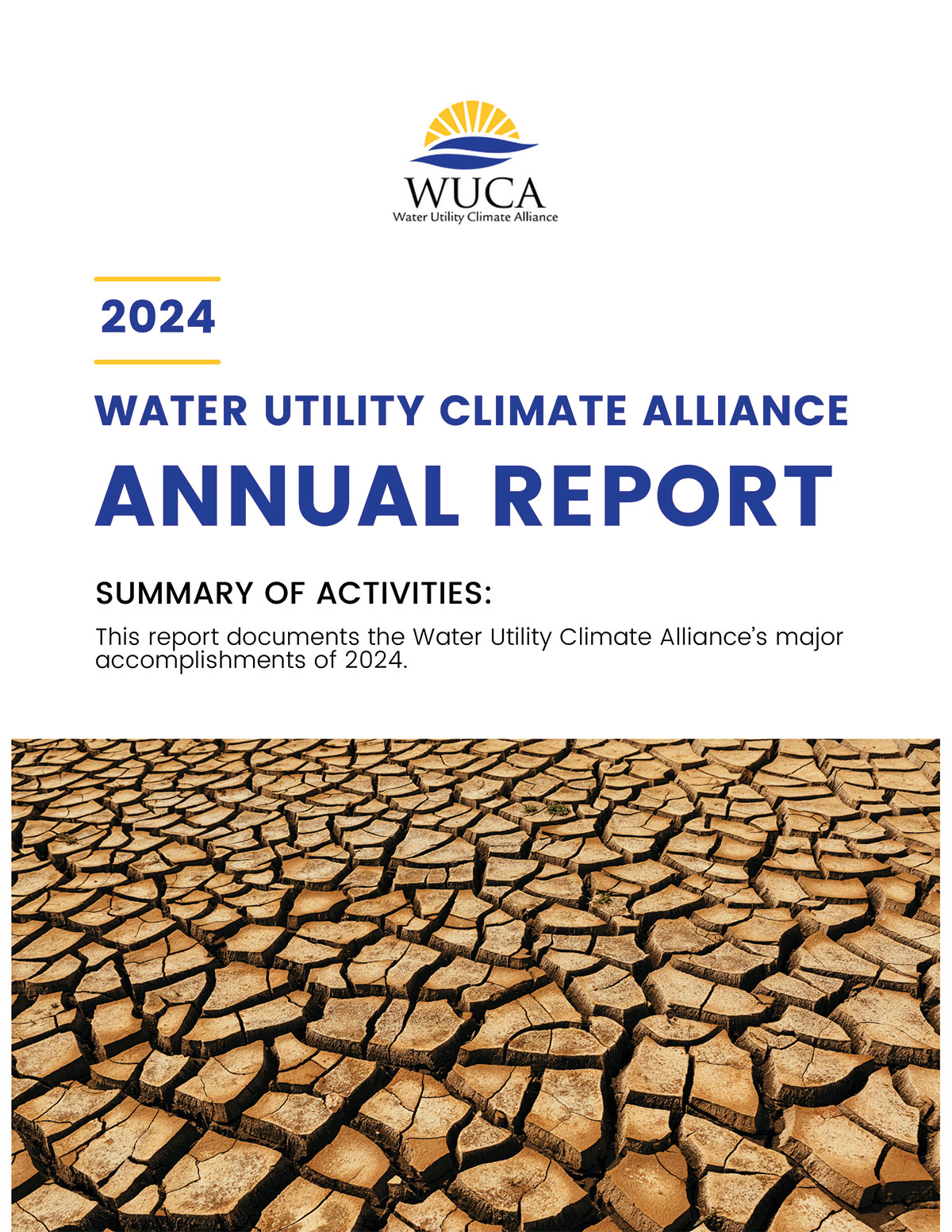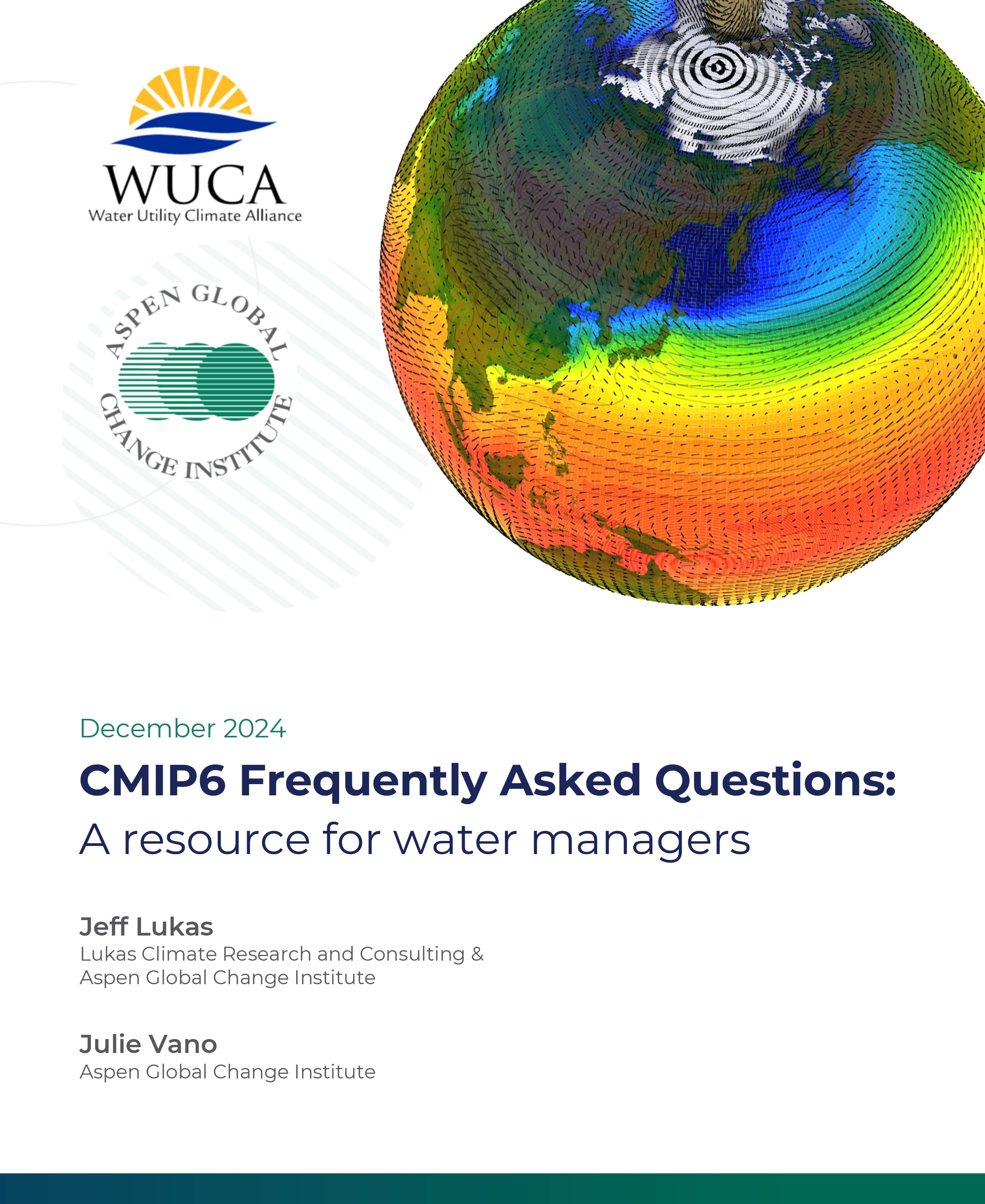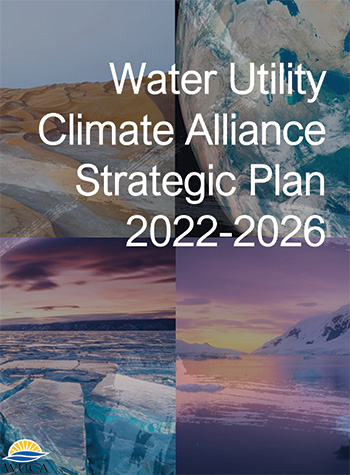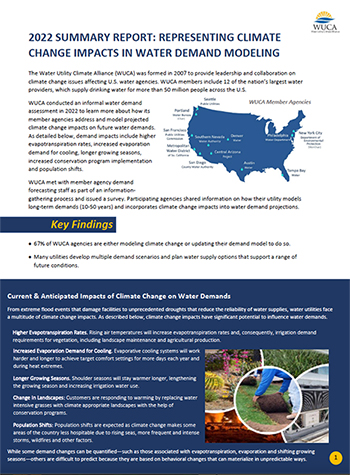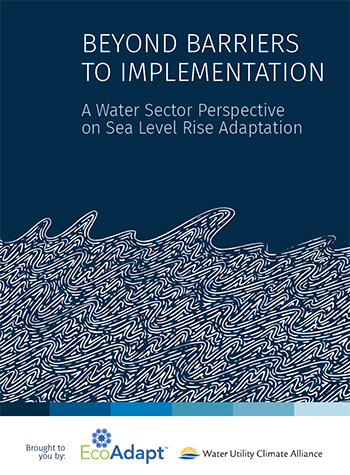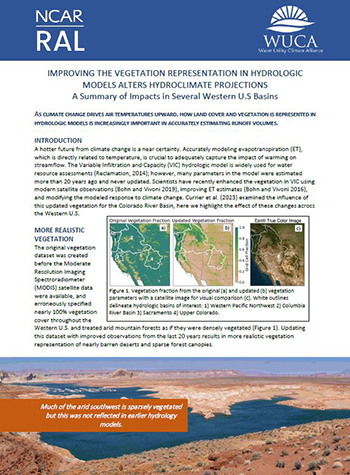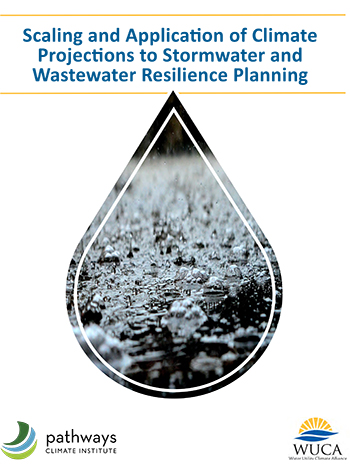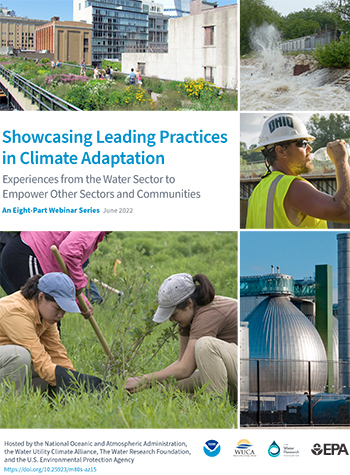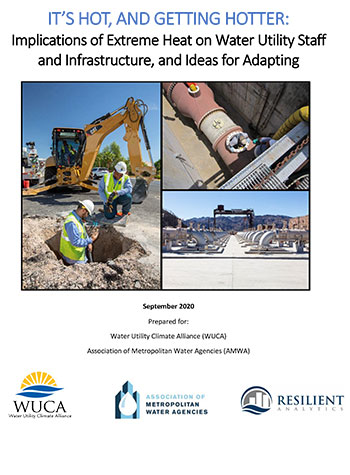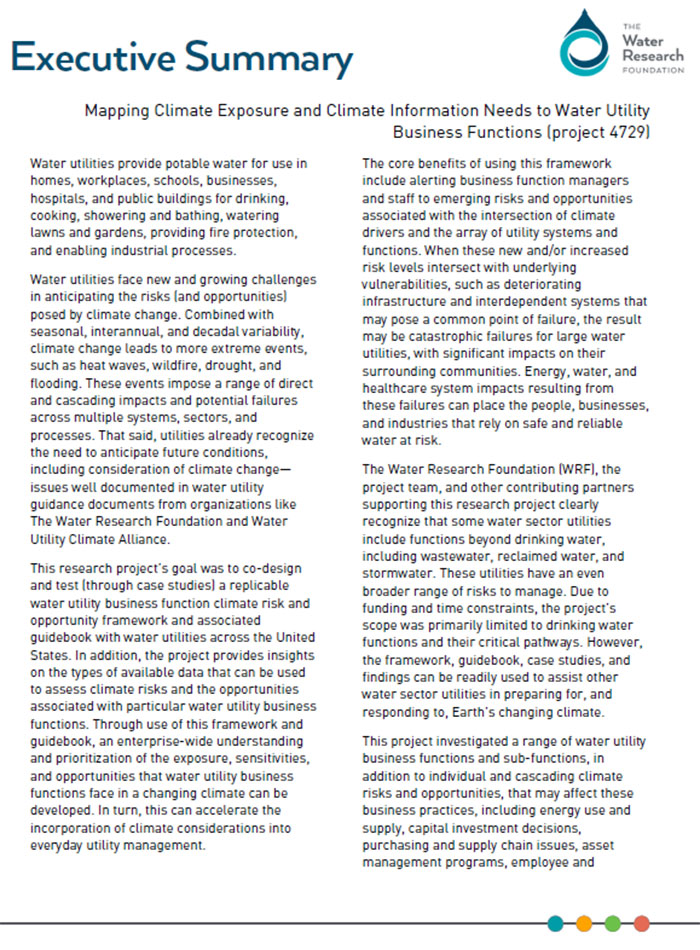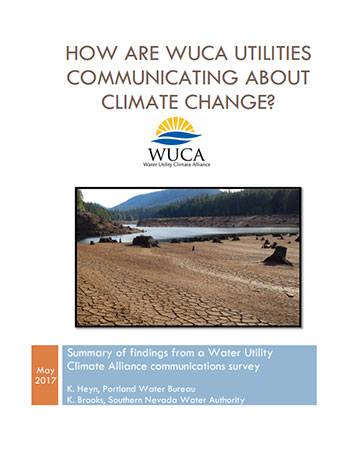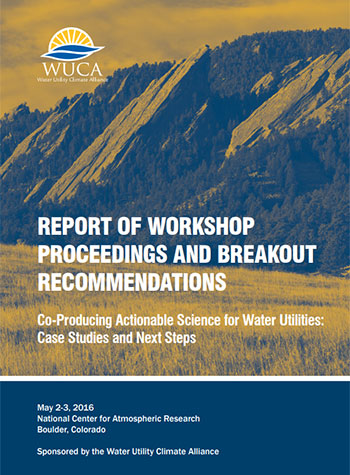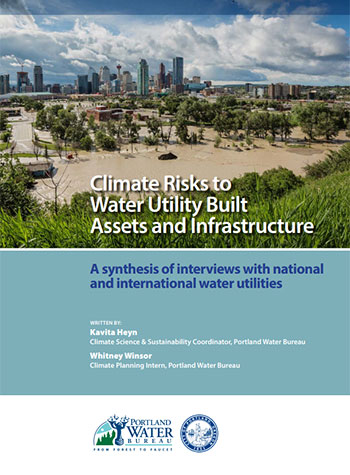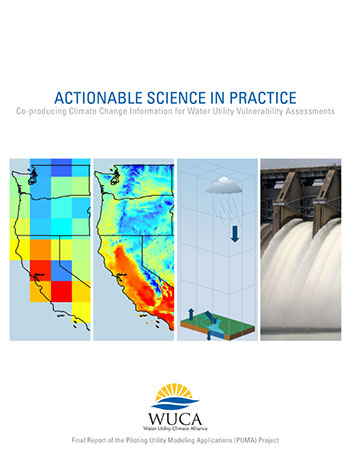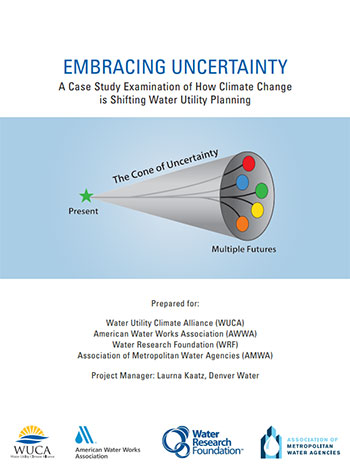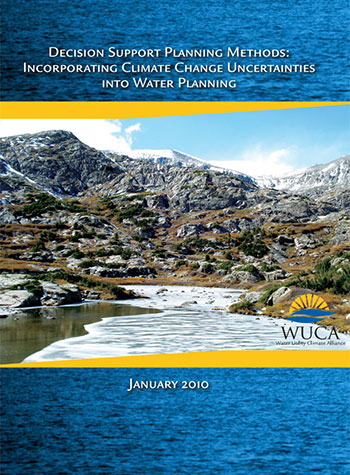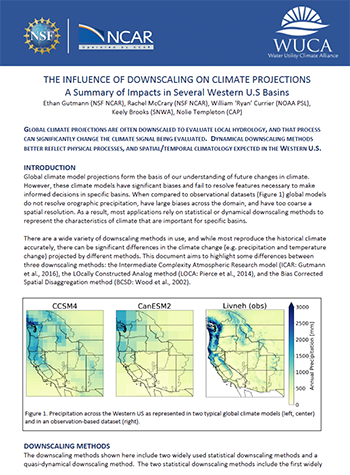The Water Utility Climate Alliance aims to enhance the quality and accessibility of regional climate change data to help reduce uncertainty and improve water resource planning, promote the development of adaptation strategies, assist overall decision-making efforts and support the development of water-related policies.
The following plans, activities and publications support this objective.
Strategic Plan & Publications
2024 Water Utility Climate Alliance Annual Report
This report documents the Water Utility Climate Alliance's major accomplishments of 2024.
How Do North American Water Agencies Define Water Supply Level of Service
In this report, we present a framework for water supply level of service evaluation using five core elements – system dynamics, future scenarios, performance indicators, risk tolerance, and equity.
CMIP6 FAQ
This guide addresses 13 key questions designed to enhance understanding and practical application of CMIP6 datasets, focusing on the contiguous United States. Crafted through an iterative process involving Working Group members and external experts, it provides clear, accessible responses to help water managers navigate and interpret these complex datasets with confidence.
2022-2026 Strategic Plan
WUCA's Strategic Plan serves as the primary guidance document for the alliance's long-term efforts. The plan was developed by the Strategic Planning Committee, which included staff members from each WUCA agency. It covers a five-year period of 2022-2026; however, it is reviewed annually as part of the work plan development process and updated as needed.
Representing climate change impacts in water demand modeling (2022)
WUCA conducted an informal water demand assessment in 2022 to learn more about how its member agencies address and model projected climate change impacts on future water demands.
Beyond barriers to implementation
A water sector perspective on sea level rise adaptation.
Improving the Vegetation Representation in Hydrologic Models Alters Hydroclimate Projections
This report illustrates the impact of vegetation changes over the Western U.S.
IT’S HOT, AND GETTING HOTTER: Implications of Extreme Heat on Water Utility Staff and Infrastructure, and Ideas for Adapting (2022)
This report describes the implications of expected increasing temperatures in the U.S. on utility personnel and facilities and provides adaptation and mitigation strategies to address these heat impacts.
Project 4729 - Mapping Climate Exposure and Climate Information Needs to Water Utility Business Functions - Executive Summary (2020)
The goal of this project was to develop a comprehensive, enterprise-level framework for understanding the exposure and sensitivities of water utility business functions to a changing climate and for accelerating the mainstreaming of climate considerations into utility management.
How are WUCA Utilities Communicating About Climate Change? (2017)
WUCA utilities communicate about climate change in different ways, depending on utility goals, local politics and demographics. This report summarizes key findings of a survey of the ten utilities on how they are using and developing climate change messaging for both internal and external audiences.
Co-Producing Actionable Science for Water Utilities Workshop Final Report (2016)
Hear about WUCA's Piloting Utility Modeling Applications (PUMA) Project and ideas generated regarding next steps in developing a water climate services framework at a workshop with over 50 experts from the drinking water, boundary organization, academic, federal agency, and NGO communities.
Climate Risks to Water Utility Built Assets and Infrastructure (2015)
This report describes the lessons learned from a survey that the Portland Water Bureau conducted of 18 national and international water utilities (including 9 WUCA utilities) to understand how climate risks and extreme weather events are affecting utility built assets and infrastructure. The report describes how these utilities are responding by building new infrastructure, replacing or repairing assets, changing operations, and quantifying climate risks to assets.
Actionable Science in Practice: Co-Producing Climate Change Information for Water Utility Vulnerability Assessments: Final Report of the Piloting Utility Modeling Applications (PUMA) Project (2015)
Explore successful partnerships where climate scientists and utility operators throughout the United States apply climate science in resilience planning. Major conclusions include the need for local assessments, the importance of two-way communication and the need for reconciling top-down and bottom-up assessment approaches.
Embracing Uncertainty: A Case Study Examination of How Climate Change is Shifting Water Utility Planning (2015)
See how 13 utilities integrate climate change data into their planning. Discover the importance of public engagement in the planning process and learn the key distinctions between climate projections and predictions.
Decision support planning methods: Incorporating climate change uncertainties into water planning (2010)
Utilities need multiple-outcome planning as they face climate change. Learn about decision support planning methods like classic decision analysis, real options and portfolio planning.
The Influence of Downscaling on Climate Projections (2024)
Global climate projections are often downscaled to evaluate local hydrology, and that process can significantly change the climate signal being evaluated. Dynamical downscaling methods better reflect physical processes, and spatial/temporal climatology expected in the Western U.S.
Work Plan
Using the 5-year Strategic Plan and an assessment of prior-year accomplishments as guidance, WUCA staff develop a work plan reflecting current priorities for the upcoming year. Priorities for 2025 include the following:
- Climate Resilient Engineering Design Guidance: WUCA will develop a list of practical, tangible, Climate Resilient Design Guidance strategies for a range of water utility engineering, infrastructure, and capital projects, and develop a climate risk hazard matrix that describes common climate risks, impacts and climate hazards that water systems are facing.
- Purpose Driven Climate Data Selection and Application: Case studies for Water Managers, Planners, and Modelers: WUCA will develop case studies to capture how water utility managers, planners, or modelers determine what climate data to use to answer specific planning or modeling question related to water resource planning, water quality, stormwater management, and other topics.
- Climate Resilience Training & Leading Practices in Climate Adaptation Planning: WUCA will continue to enhance understanding of the capabilities and limitations of climate science and share best practices for using it in water, wastewater and stormwater utility adaptation planning and decision making; furthermore, WUCA will leverage the Practitioner Exchange for Effective Response to Sea Level Rise (PEERS) network to build on traditional WUCA climate resilience training aimed at sea level rise resilience.
- Planning Ahead for 20 Years of WUCA: WUCA will initiate the first phase of a comprehensive strategic planning process to prepare for the development of WUCA's next 5-year strategic plan (2027-2031), beginning with an assessment of WUCA as a coalition, including current and future priorities, and developing recommendations for how WUCA can advance priority objectives.
- Assessing Existing and Potential Applications of Decision Making under Deep Uncertainty (DMDU): This project will assess current and potential applications for the DMDU framework at WUCA utilities, including developing a baseline assessment of where DMDU has been applied, and potential future applications for WUCA members.
- Evaluating the Impact of Case Studies in Climate Adaptation Decision Support: WUCA will work with the Aspen Global Change Institute to help test, validate, and learn from previous WUCA leading practices. The goals are to learn what more generally makes an adaptation case study impactful, investigate the case study development process, and identify what case studies alone cannot achieve.
- Leveraging Climate Modeling to Produce Precipitation Intensity-Duration-Frequency Curves: WUCA will develop a prototype for sustained collaboration between utilities and climate modelers to produce precipitation projections that go beyond statistical downscaling; and partner with several entities to scope an approach to replicate work completed by San Francisco Public Utilities Commission to model large-scale storm events and to develop projections for New York City and Philadelphia.
- Advancing Water Equity and Climate Resilience: WUCA will develop implementation strategies for the Equity Framework and Roadmap, co-developed with the US Water Alliance, to incorporate equity into WUCA efforts.
- Making the Case for Climate Resilient Water Infrastructure and Supporting Strategies: In partnership with the Water Research Foundation, develop water sector-specific guidance and a framework on how to make the case for investments in climate-resilient stormwater/wastewater/drinking water infrastructure, considering both structural (i.e., physical assets) and non-structural approaches (i.e., codes and standards).
- Tools & Technology: WUCA will convene to discuss existing, new, and emerging tools and technology that have a particular relevance for climate adaptation.
- Climate Financial Risk: WUCA will discuss and share information, learnings and recommendations related to integrating climate risk into financial planning, bond offering statements and insurance coverage.
- Water Demand Forecasting: WUCA will continue to facilitate peer to peer learning sessions focused on water demand modeling, and how climate change is integrated into demand forecasting and long-range water resource planning.
- Sea Level Rise: WUCA will facilitate peer to peer learning sessions focused on sea level rise adaptation best practices, coordinating with the Practitioner Exchange for Effective Response to Sea Level Rise (PEERS) and building on the WUCA report "Beyond Barriers to Implementation: A Water Sector Perspective on Sea Level Rise Adaptation."
- External Engagement: Partnerships and National Reports- On an as needed basis, WUCA will review and provide comments on critical national adaptation efforts and federal climate reports and communicate with water sector associations and other partners on positions.
- WUCA Network: WUCA will continue to foster engagement with utility collaborators outside of WUCA to create a community of climate adaptation knowledge transfer and sharing and share WUCA products and knowledge with peer utilities and network members.
- Learning From Each Other (LFEO): WUCA will continue to host webinars to learn about emerging science, what others in the sector are doing to address and adapt to climate change, and about how member utilities and practitioners are using climate information. WUCA will strive to bring in new and diverse voices to these conversations to support integration of equity in WUCA webinars.
- Sustain the Coalition: WUCA will continue to organize small group discussions and peer sharing between WUCA staff members outside of the regular meeting schedule and at annual staff meetings to facilitate relationship building.

Sea Level Rise Adaptation Exchange: Leading Practices for Moving from Assessment to Action
June 23-24, 2021, the WUCA Sea Level Rise (SLR) Committee and their consultant, EcoAdapt, held a virtual forum titled "Sea Level Rise Adaptation Exchange: Leading Practices for Moving from Assessment to Action." The forum gathered over 60 resiliency leaders from around the country to discuss sea level rise adaptation opportunities and barriers, including the unique challenges faced by water utilities and other infrastructure managers.
The forum facilitated peer-to-per knowledge exchange, providing a space for open conversations about the barriers to action while also highlighting case studies with leading practices and tangible solutions.
Each day of the forum kicked off with presentations by WUCA members on their sea level rise adaptation efforts followed by case studies from Miami-Dade, Virginia Beach, Boston and San Francisco illustrating leading practices and lessons learned. Both days concluded with facilitated breakout sessions organized by the barriers to implementation: technical, financial, social/cultural and governance.
The forum was part of a larger project called A Field Guide to Sea Level Rise Adaptation for the Water Sector: Moving Beyond Risk Assessment to Implementation, intended to document the leading practices in SLR adaptation for the water sector. Building on the WUCA Leading Practices project, this effort focuses on a specific climate stressor—sea level rise—and a specific part of the adaptation process—implementation. The final product will serve as a guide to help utilities and their municipalities advance SLR adaptation efforts and address barriers to implementation.
(Project Manager: Abby Sullivan, Philadelphia Water Department)Project 5056 - An Enhanced Climate-Related Risks and Opportunities Framework and Guidebook for Water Utilities Preparing for a Changing Climate
Between 2019–2021, Denver Water and the San Francisco Public Utilities Commission (SFPUC) collaborated to test, update, and refine the Mapping Climate-Related Risks and Opportunities to Water Utility Business Functions Framework through a series of internal, interactive tabletop exercises (TTX). This guidebook is a supplement to the framework intended for water utility business function leads to use as they begin to assess the climate-related risk and opportunities associated with their critical business functions.
Note: This guidebook is an update to the 2020 supplemental guidebook to Mapping Climate Exposure and Climate Information Needs to Water Utility Business Functions, where seven U.S.-based water utilities co-created a comprehensive, enterprise-level framework to help business function leads understand the exposure and sensitivities of their business functions in a changing climate.
Project 4729 - Mapping Climate Exposure and Climate Information Needs to Water Utility Business Functions
The goal of this project was to develop a comprehensive, enterprise-level framework for understanding the exposure and sensitivities of water utility business functions to a changing climate and for accelerating the mainstreaming of climate considerations into utility management. The water utility business risk and opportunity framework was designed to be replicable for use by a range of utility sizes, impacts, and functions. Though this framework specifically focused on drinking water utilities, its approach has broader applicability across a variety of utilities.
Other publications
Below, please find select publications produced in collaboration with WUCA or including contributions from WUCA members.
- Colorado River Basin Climate and Hydrology: State of Science (2020)
- Insurance, Bond Ratings and Climate Risk - A Primer for Water Utilities (2019)
- Co-Producing Actionable Science for Water Utilities (2016)
- Colorado River Basin Stakeholders Moving Forward to Address Challenges Identified in the Colorado River Basin Water Supply and Demand Study (2015)
- Climate Change in Colorado (2014)
- Climate Resilience Evaluation and Awareness Tool 2.0 Exercise with Southern Nevada Water Authority (2014)
- Changes in Water Use Under Regional Climate Change Scenarios (2013)
- Summary report of the Climate Change for Effective Resource Management and Public Policy in the Western United States workshop (2013)
- Colorado River Basin Water Supply and Demand Study (2012)
- Joint Front Range Climate Change Vulnerability Study (2012)
- Articles on nonstationarity published in Colorado Water: Newsletter of the Water Center of Colorado State University (2010)
- Proceedings of the Water Utility Climate Alliance Piloting Utility Modeling Applications (PUMA) Workshop (2010)
- Options for improving climate modeling to assist water utility planning for climate change (2009)
Member agency resources
Austin Water
Central Arizona Project
Denver Water
Metropolitan Water District of Southern California
New York Department of Environmental Protection
Philadelphia Water Department
Portland Water Bureau
San Diego County Water Authority
San Francisco Public Utilities Commission
Seattle Public Utilities
Southern Nevada Water Authority
- The potential effects of climate change and drawdown on a newly constructed drinking water intake: Study case in Las Vegas, NV, USA (2021)
- Water Resource Plan (Current)
- Colorado River Hydrology Research Symposium (2017)
- Climate Conditions in Clark County, NV (2018)
- Climate Change Modeling of Lake Mead: Extrapolating Model Results to Biological Change (2014)
- Modeling Impacts of Climate Change on Lake Mead (2013)
- Modeling Water Quality in Lake Mead: Climate Change, Algal Succession, and Operational Effects (2013)
Tampa Bay Water
- Evaluation of impacts on future climate change and water use scenarios on regional hydrology (2018)
- Florida's Climate: Changes, Variations, & Impacts (2017)
- A Level-of-Service Concept for Planning Future Water Supply Projects under Probabilistic Demand and Supply Framework (2015)
- Innovative Systems-Based Decision Support: Tales for the Real World (2015)
- Recommended Projection of Sea Level Rise in the Tampa Bay Region (2015)
- Reducing bias-corrected precipitation projection uncertainties: a Bayesian-based indicator-weighting approach (2013)
- Tampa Bay Water climate variability and projections on regional water supplies project technical report (2013)

